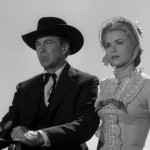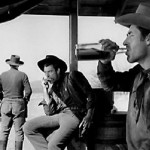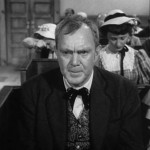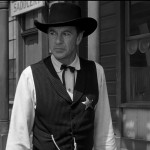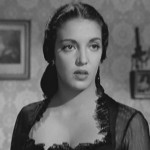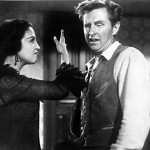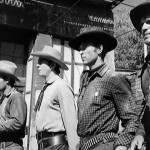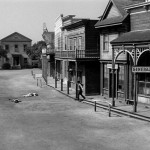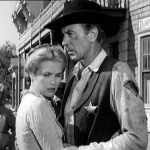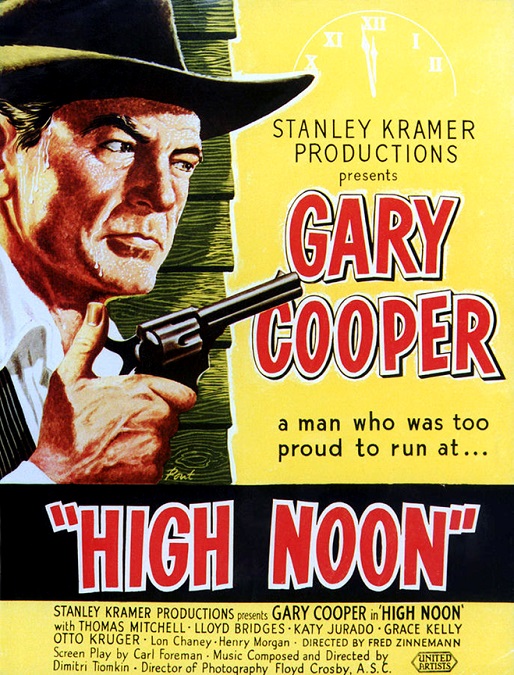
High Noon – 1952
Gary Cooper is back in a role that some call his best. This film was a western, but it wasn’t your traditional western. Most westerns of the era were packed full of fast-paced action sequences, but High Noon threw that formula out the window. The only action in the film took place in the last ten minutes. The rest of it was really a drama about a man who was the Marshall in a town full of fair-weather friends.
Aside from Cooper, playing the part of Marshall Will Kane, the film also starred a virtual newcomer to world of film, Grace Kelly, playing the part of Amy Fowler Kane, his new wife. But the film also boasted a few other names that I already knew from more modern times. A young Lloyd Bridges played Kane’s faithless deputy, Harvey Pell. Harry Morgan played a craven townsperson. Another favorite of mine, Thomas Mitchell, played the selfish mayor Jonas Henderson.
The story can actually be summed up pretty quickly. The evil Frank Miller, played by Ian MacDonald, was coming to town on the noon train to murder Marshall Kane with his three cohorts. The three killers spend most of the film waiting at the train station, allowing the tension to build and build to a shoot-em-up climax.
Kane is first seen getting married to Amy, a Quaker who is against killing. When he hears of his gathering executioners, he is told to leave town with his new bride, but his conscience will not allow him to abandon the town he has cleaned up and grown to love. He returns to the town to take care of his responsibilities like a man, even though Amy threatens to leave him if he fights the men.
Kane goes to all the men of the town to enlist them as emergency deputies in order to meet the threat and keep the streets safe. But each of them, for their own reasons, refuses him. One after another rejects him and leaves him to face his suicide mission alone. In the end, he is forced to realize that those who called themselves his friends when there was no trouble, have abandoned him when he is up against four killers.
Miller’s train arrives right no time and the gunfight begins. The only way Kane is able to survive is with the help of the one person who should have never been involved. His wife, Amy, kills one of the men herself, allowing Kane to beat his final foe. And I loved how, after the fight is over, Kane throws his badge to the ground at the feet of all his so-called friends who had left him to die alone, as if to say, “It is done. I owe you traitors nothing, ever again.”
It was a drama that could easily be translated to almost any other time period. It just happened to take place in the Old West. The director, Fred Zinnemann, who was nominated for Best Director, though he did not win, made a film that was actually quite controversial for its time. It was filmed and released during the second Red Scare and the Korean War. The House Un-American Activities Committee was finding Communists in everything.
Actor John Wayne disliked the film because he felt it was an allegory for blacklisting, which he actively supported. He called High Noon “the most un-American thing I’ve ever seen in my whole life.” He actively helped to blacklist the film’s screenwriter, Carl Foreman, from Hollywood. When Gary Cooper, who later strongly opposed blacklisting, won the award for Best Actor for his work on the film, he was not able to be at the awards ceremony to accept the award. Ironically, John Wayne accepted it for him.
However, I personally didn’t see anything un-American about the film at all. Apparently, critics thought that it was un-American for a U.S. Marshall to ask for help in solving his problems, and that he was saved by a woman in the end. Balderdash! All I saw a film that was well-made and interesting to watch. Zinnemann did a fantastic job of building tension to a point where you can’t help but get wrapped up in the drama. And I thought it was powerful story-telling in the way that the woman had to go entirely against her principles to save her husband’s life. I’m generally not a big fan of westerns, but this one was unconventional enough that it won me over.
